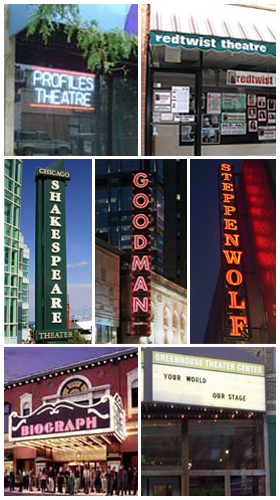
So on to this hubristic feast of xenophobia, special pleading and Chicago cheerleading! But, yes, there are legitimate and authentic differences between Chicago actors and their counterparts on the coasts. Stereotypes don't become reliable or cliches convenient for no reason
Though it's clearly a chicken-or-the-egg paradox, Chicago actors inevitably reflect the theater they create (or that shapes them). If our five Tony Awards for regional theater prove anything, it's that ensemble acting is a triumph that comes with the territory. Actors here stick together longer than on either coast, as the results show. New troupes form almost weekly. Older ones can stay together for years, allowing novice thespians to learn their craft by paying their dues and graduating from playing ingenues to impersonating graybeards.
Plus, unlike New York, where Broadway calls the shots, or L.A., where "The Industry" reduces theater productions to "showcases" for individuals, not companies, in Chicago there are safety nets. You can fail without forfeiting your resume. If an actor looks good, it's often because or, rather than despite, the other folks who shared the stage.
Los Angeles is a town that, situated over fault lines that are just waiting to open up and devour the Kodak Theatre during an Oscar ceremony, is mired in a state of denial called California. Now that 3-D has hit the big screen, theater in L.A. is totally expendable, since sharing the same time as well as space as the actors, is much less important than special effects. When the Big One finally hits, it will just seem like a disaster movie taken over the top and out of the studio.
As for New York, "If you can make it there, you can make it anywhere" is strangely left-handed praise: If it's so great, why should it matter where ELSE you make it? It sounds as if you're supposed to go there first to get good, then somewhere else to turn great. (As in HERE...) The big deal about the Big Apple is that success between the Hudson and East rivers inevitably arrives one kudo at a time, as in one Tony Award followed by another.
In Chicago a more proper measure in theatrical success is the Joseph Jefferson Award for ensemble acting: Whether it's non-Equity or union-based, it's one of the happiest moments in either annual prizefest. There's enough communal euphoria and deep-dyed gratitude in the air for that award to levitate the Park West club or the North Shore Center for the Performing Arts. You feel it in the generous thanks from individual recipients to the theaters that gave them a chance and inspired them to rise to their occasion. These are the bonds that make Chicago theater, not just a movable feast, but a communal celebration, opening by opening, run by run, year after year.
In Chicago the theatrical whole is way bigger than its parts, a saving truth that gives a sense of proportion and purpose to the individual achievements of actors, designers, directors and even critics. Industry nights give our Thespians a chance to see what others are doing and measure themselves, not just against their own capacities, but the wide-eyed dreaming of the other troupes around town. Actors may "compare and despair" but it's a friendly rivalry that, like a rising tide, lifts all our boats.
If you see enough shows over a ton of time, as I have, you can see evolution in operation--how the eavesdropping naturalism of Steppenwolf's early days complemented the playful vulgarity of Stuart Gordon's Organic Theater Company, how the "let's make a show" enthusiasm of the Victory Gardens Theater when it began in Wrigleyville was echoed by another theater that also began in the Northside Auditorium Building, Bailiwick Rep (now Chicago). The Body Politic begat a similar artists colony in what used to be called the Theatre Building (now Stage 773), while, one door down, Theatre Wit's new playhouse (formerly Bailiwick's) insures that there are a record six theaters on one block. Short of the eight inside the Denver Theatre Center, that's a record that neither Tinsel Town nor Gotham can equal.
Well, any more grand conclusions and I risk cheapening the currency of commentary... (But you can't say you weren't warned.) Still there's more than Method to our madness. Chicago is a very elemental town-as in vicious winters and blistering summers-that's forced to manufacture its own fantasies. We have no palm trees to provide a semi-tropical escapism. What you see is what you get. In the face of such ruthless realism as seches, blizzards, heat waves, power failures and potholes, our theaters work overtime to create their own saving make-believe. Sure, we can resort to "smoke and mirrors" spectacles like Las Vegas in heat, but our "tricks of the light" ultimately come down to the bedrock definition of theater-"two boards and a passion." The real deal--if we build it they will come.
Lawrence Bommer
Contributing Writer
